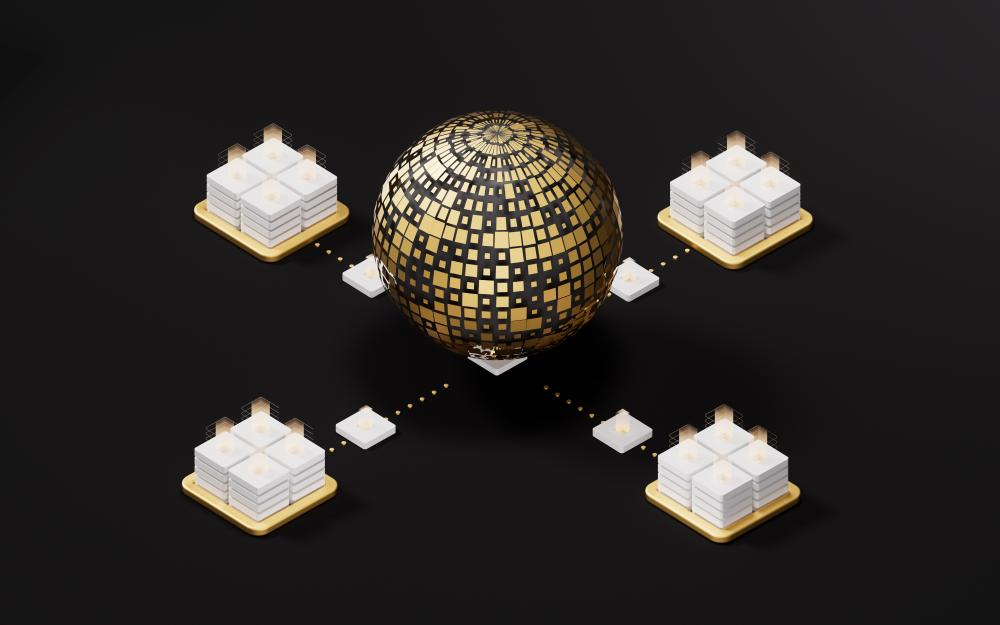
Exploring Decentralized Domain Services
The world of decentralized domain service is a fascinating arena, poised to revolutionize the way we interact with the web. At its core, decentralized domain service signifies a paradigm shift from traditional, centralized domain registration to a model that offers users more control and transparency. By leveraging blockchain technology, these services introduce a layer of security that traditional systems lack, allowing users to own and manage their domains without intermediaries.
One of the primary benefits of this service is its ability to provide censorship resistance. In a decentralized domain service model, domains are not held by centralized authorities, making it extremely difficult for any single entity to take down a domain. This has significant implications for free speech and access to information, particularly in regions where censorship is prevalent.
Moreover, decentralized domain services often integrate seamlessly with existing web3 technologies, making them a natural fit for those already operating in the digital asset space. This integration not only streamlines user experiences but also enhances functionality by enabling direct interaction with decentralized applications and services.
The Key Features of Decentralized Domain Service
Decentralized domain service comes packed with several innovative features that distinguish it from its centralized counterparts. A standout feature is the ownership model, where users hold cryptographic keys to their domains, granting them unparalleled control and security. This means that users can transfer, sell, or modify their domains independently, without relying on a registrar.
Another notable aspect is the transparency that blockchain records provide. Every transaction related to a domain is logged on a public ledger, ensuring a verifiable history that can be trusted by all parties involved. This transparency mitigates fraud and builds trust within the domain marketplace.
The cost-effectiveness associated with decentralized domain service is also a significant advantage. Traditional domain registrations often entail recurring fees and renewal costs, but decentralized systems eliminate many of these expenses by avoiding intermediaries. This makes domain management more affordable for individuals and businesses alike.
Additionally, the security features inherent in decentralized domain service cannot be overstated. By decentralizing the control and management of domains, these services drastically reduce the risk of hacking or unauthorized access, offering peace of mind to domain owners.
Personal Insights into the Decentralized Domain Revolution
Having observed the evolution of web technologies over the years, the introduction of decentralized domain service feels like a pivotal moment. It reminds me of how the internet itself experienced a boom, reshaping industries and disrupting established norms. Now, decentralized domains are poised to do the same, offering a more democratic and secure internet experience.
In my professional journey, I’ve witnessed firsthand how blockchain technologies have ushered in a new era of innovation. The decentralized domain service is not just a technical advancement but a philosophical shift towards empowerment and user autonomy. It aligns with the broader trend of decentralization in finance, communication, and more.
The anecdotal evidence from my colleagues further amplifies the potential of this technology. Many have expressed excitement about the ability to truly own digital real estate without arbitrary restrictions or fees, likening it to owning property in the physical world. This shift is not just about technology but about redefining ownership in the digital age.
Indeed, the decentralized domain service revolution is just beginning, but its implications are vast and transformative. As more individuals and organizations embrace this model, it will likely become an integral part of our digital landscape, much like other blockchain innovations that have already gained traction.
Frequently Asked Questions
How does a decentralized domain service work?
A decentralized domain service operates on blockchain technology, where domain information and ownership details are stored securely across a distributed network. This ensures that control is not centralized, allowing users direct management of their domains.
What are the primary benefits of using a decentralized domain service?
The main benefits include enhanced security, resistance to censorship, increased transparency, and cost efficiency. These advantages make decentralized domain service an attractive alternative to traditional domain management systems.
Can anyone register a domain with decentralized domain service?
Yes, anyone with access to the required tools and a basic understanding of blockchain can register a domain through a decentralized service. This decentralized approach democratizes domain registration, allowing broader participation.
Will decentralized domain service replace traditional systems?
While it offers many advantages, decentralized domain service might not completely replace traditional systems. However, it is likely to coexist and provide an alternative for those seeking more control and security over their domains.

Decentralized Domain Platform Overview
The rise of the decentralized domain platform marks a significant shift in how the internet is structured and perceived. At its core, this revolutionary concept aims to distribute control and ownership of domains away from centralized authorities like ICANN. This shift allows users to partake in a more democratic and transparent internet ecosystem. A decentralized domain platform gives users the autonomy to manage their digital identities and properties without relying on traditional top-down systems.
One of the central advantages of a decentralized domain platform is its potential to enhance online privacy and security. By utilizing blockchain technology, these platforms create a secure and immutable record of domain ownership, reducing the risk of fraud and unauthorized access. This newfound security allows users to surf the web with increased confidence, knowing their data and digital identities are protected from nefarious actors.
Moreover, decentralized domains empower users by providing censorship-resistant alternatives. In countries where internet access is heavily controlled, a decentralized domain platform can be a lifeline for free expression. The ability to bypass centralized control ensures that voices remain heard, aligning with the greater vision of a free and open internet for all.
Features and Benefits of Decentralized Domains
A major feature of a decentralized domain platform is the integration of Web3 technology, which enhances user interaction and personalization. Through the staking of $space tokens, users can ensure their chosen keywords have heightened visibility on web browsers. This feature not only enhances personal branding efforts but also improves the overall discoverability of digital content within the Web3 ecosystem.
In addition to search visibility, decentralized domains offer seamless integration with social media and marketing platforms. Purchasing a #hashtag domain transforms social media mentions into clickable links, expanding reach and engagement. This capability allows individuals and businesses to transform their social media strategies, turning each mention into an opportunity for increased traffic and potential monetization.
Decentralized domains also feature decentralized email and streaming services, offering users a comprehensive suite of tools for their online presence. These services enhance both communication and content delivery, empowering users to take full control of their digital interactions. The inclusion of decentralized video storage ensures secure and efficient content management, opening new avenues for monetization and content dissemination.
Embracing the Decentralized Future
The future of digital interaction lies within the innovations driven by decentralized domain platforms. By decentralizing control and empowering users, these platforms embrace the ethos of a more equitable internet landscape. Individuals and organizations can now break free from the constraints of traditional systems, allowing for true ownership and autonomy over their digital assets.
Engaging with decentralized domain platforms provides a wealth of opportunities to explore new business and marketing strategies. The ability to decentralize web hosting through a node network offers increased security and reliability for online properties. Such a system supports the vision of a truly decentralized web, where users have full control over their content and its distribution.
By joining this movement, users position themselves at the forefront of digital innovation, participating in a decentralized domain platform ecosystem that is shaping the next generation of internet experiences. Whether for personal use or business endeavors, decentralized domains offer a compelling alternative path that aligns with the evolving needs of internet users everywhere.
The transformation brought about by decentralized domain platforms goes beyond technical advancements; it represents a fundamental shift in how individuals and businesses engage with the digital world. As this technology progresses, it promises to redefine the boundaries of what is possible on the internet, encouraging exploration and innovation in every sector.
Decentralizing Your Digital Presence
In an era where internet reliability and security are increasingly desired, the need for a Decentralized Domain Provider is more pivotal than ever. #HashtagSpace offers a compelling solution for individuals seeking enhanced privacy and control over their online identity. By purchasing a #hashtag, users can transform any social media mention into a clickable link, promoting their desired URL and resisting censorship with a diversified web3 presence. This service is especially beneficial for those who conduct business online, enabling them to establish a decentralized digital footprint that isn’t easily influenced by central entities.
Decentralized Domain Providers like #HashtagSpace empower their users with tools to explore the web without the prying eyes commonly associated with traditional internet services. By decentralizing your email and communication channels, you can send messages with a greater sense of privacy. Additionally, video storage on a personalized hashtag channel opens up new avenues for content creators to monetize their work, allowing them to retain more control over how their media is distributed and consumed.
Advantages of Web3 Marketing
Web3 marketing harnesses the power of blockchain technology to redefine how digital marketing operates within decentralized networks. This move towards decentralization offers unique benefits over traditional marketing approaches. By staking $space on specific keywords, users can ensure their content achieves high visibility in search results, directly connecting with their targeted audience.
With a Decentralized Domain Provider, users can enhance their online presence by participating in decentralized marketing strategies. Marketing in the web3 era is distinct; it offers users the ability to promote their hashtags across platforms, ensuring their message reaches intended audiences without the interference of third-party entities. This innovative approach also allows for personalized ad placements, vastly improving the efficiency and effectiveness of marketing campaigns.
The decentralized nature of web3 marketing reduces reliance on central platforms that control ad placements and viewership analytics, allowing for more authentic and personalized engagement. This shift offers businesses a new paradigm in how they approach potential customers, ensuring transparent tracking and engagement that aligns with the unique ethos of web3.
Exploring Decentralized Domain Provider
The concept of a Decentralized Domain Provider is transformative, particularly in how internet domains are registered, bought, and sold. With #HashtagSpace, users enter a realm where transparency and efficiency are at the forefront. This service alleviates the common hassles associated with traditional domain transfers, such as prolonged waiting periods and bureaucratic bottlenecks.
By embracing this innovative approach, users can trade and transfer domain ownership seamlessly, optimizing time and cost. A decentralized framework allows individuals to control their assets directly, bypassing traditional middlemen and intermediaries. This autonomy is crucial in an era where digital ownership is increasingly linked to individual freedom and privacy.
Furthermore, the platform’s focus on facilitating direct transactions between users without relying on centralized control offers distinct advantages. The ability to manage one’s digital identity and web presence without interference is a powerful tool for both businesses and individuals looking to thrive in the new digital landscape.
This leap towards decentralized services marks a shift in how internet governance and control are perceived, providing an ecosystem where independence and privacy are prioritized. As the internet continues to evolve, Decentralized Domain Providers like #HashtagSpace pave the way for future advancements in digital autonomy.

What is a decentralized domain?
In the simplest terms, a decentralized domain refers to a domain whose ownership and management are conducted over a blockchain network, eliminating the need for intermediaries like traditional domain registrars. This approach ensures that users have full control over their digital real estate, allowing them to resist censorship and enhance the security of their online identities.
Think about it as owning a piece of digital property in a borderless and censorship-resistant ecosystem. It gives you the autonomy to make decisions about your domain without the typical bureaucratic red tape. Just like when you buy a physical property, you have the deeds to your digital domain, empowering you to make modifications, transfers, or sales at your discretion.
This concept is particularly appealing in today’s Internet landscape, where privacy and ownership are becoming increasingly important. By leveraging blockchain technology, decentralized domains offer a futuristic approach to identity and brand management online.
What is the difference between centralized and decentralized DNS?
Centralized DNS, which most of us are familiar with, is managed by organizations like ICANN, where domain registration and management are controlled by centralized authorities. While functional, this model can introduce vulnerabilities such as single points of failure and susceptibility to censorship.
On the flip side, decentralized DNS uses blockchain technology to distribute the management of domain data across multiple nodes, making it nearly impossible for a single entity to exert control over it. This approach not only enhances security but also ensures greater transparency and resilience against censorship.
The decentralized model promotes a more democratic and open internet by allowing users to retain control over their domains and bypass traditional gatekeepers. For those concerned about privacy and autonomy, this alternative can redefine how they engage with the digital world, providing a more secure and adaptable solution in an ever-evolving online landscape.
Is ENS decentralized?
Yes, the Ethereum Name Service (ENS) is indeed decentralized. ENS operates as a steward for the Ethereum blockchain, allowing users to register human-readable names (like yourname.eth) that are linked to blockchain addresses, content hashes, and other data. This decentralized system eliminates the need for a central authority to manage these mappings.
The advantage of ENS lies in its ability to simplify blockchain interactions, making it more accessible for individuals and businesses looking to enter the decentralized web space. By leveraging the inherently secure and transparent nature of blockchain technology, ENS ensures that names are managed in a way that is both secure and resistant to censorship, aligning with the broader ethos of decentralized services.
What is an example of a domain name service?
An example of a domain name service (DNS) is the traditional service provided by ICANN, which manages the global namespace of the internet and ensures that web addresses are uniquely assigned and mapped to specific IP addresses. This centralized system helps people easily navigate the web by translating human-friendly domain names into machine-readable IP addresses.
In contrast, decentralized domain services like ENS (Ethereum Name Service) or Unstoppable Domains offer a blockchain-based alternative, where domain information is stored on a public ledger, enabling users to own and control their domains directly. These services illustrate a shift towards a more democratized and secure domain management system that reflects the growing emphasis on privacy and user autonomy in the digital age.
As the internet continues to evolve, the role of decentralized domain services is becoming increasingly significant, providing a glimpse into the future of how we might navigate and interact with the web.
Resources
- Internet Corporation for Assigned Names and Numbers (ICANN) – ICANN is a nonprofit organization responsible for coordinating the maintenance and procedures of several databases related to the namespaces and numerical spaces of the Internet. They oversee the operation of the Internet’s Domain Name System.
- Internet Society – The Internet Society is a global nonprofit organization dedicated to ensuring the open development, evolution, and use of the Internet for the benefit of all people throughout the world.
- World Wide Web Consortium (W3C) – The W3C is an international community that develops standards to ensure the long-term growth of the Web. They work to lead the Web to its full potential by creating technical specifications and guidelines.
- Ethereum – Ethereum is a decentralized platform that enables the creation of smart contracts and decentralized applications (DApps). It is a prominent blockchain network that supports various decentralized services, including domain registration.
- InterPlanetary File System (IPFS) – IPFS is a protocol and network designed to create a content-addressable, peer-to-peer method of storing and sharing hypermedia in a distributed file system. It offers a decentralized approach to storing and accessing data on the web.
